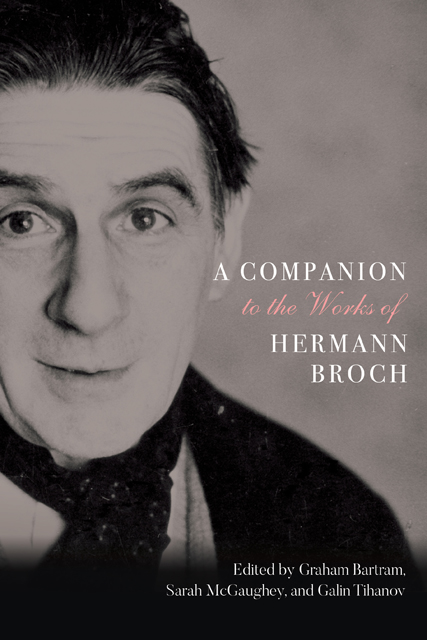Book contents
- Frontmatter
- Contents
- Preface
- Acknowledgments
- List of Abbreviations
- Introduction: Broch’s Life and Works
- 1 Perspectives on Broch’s Die Schlafwandler: Narratives of History and the Self
- 2 Hermann Broch and the Dilemma of Literature in the Modern Age
- 3 Interrogating Modernity: Hermann Broch’s Postromanticism
- 4 Broch and the Theater: Die Entsühnung and Aus der Luft gegriffen as Tragic and Comic Dramatizations of the Economic Machine
- 5 Limits of the Scientific: Broch’s Die Unbekannte Größe
- 6 Broch’s Die Verzauberung: Ludwig Klages and the Bourgeois Mitläufer
- 7 Hermann Broch’s Massenwahnprojekt and Its Relevance for Our Times
- 8 Human Rights and the Intellectual’s Ethical Duty: Broch’s Political Writings
- 9 Broch’s Der Tod des Vergil: Art and Power, Language and the Ineffable
- 10 From the “Tierkreis-Erzählungen” to Die Schuldlosen: The Creation of Broch’s Last Novel
- 11 Broch’s Legacy and Resonance
- Selected Bibliography
- Notes on the Contributors
- Index
1 - Perspectives on Broch’s Die Schlafwandler: Narratives of History and the Self
Published online by Cambridge University Press: 20 January 2023
- Frontmatter
- Contents
- Preface
- Acknowledgments
- List of Abbreviations
- Introduction: Broch’s Life and Works
- 1 Perspectives on Broch’s Die Schlafwandler: Narratives of History and the Self
- 2 Hermann Broch and the Dilemma of Literature in the Modern Age
- 3 Interrogating Modernity: Hermann Broch’s Postromanticism
- 4 Broch and the Theater: Die Entsühnung and Aus der Luft gegriffen as Tragic and Comic Dramatizations of the Economic Machine
- 5 Limits of the Scientific: Broch’s Die Unbekannte Größe
- 6 Broch’s Die Verzauberung: Ludwig Klages and the Bourgeois Mitläufer
- 7 Hermann Broch’s Massenwahnprojekt and Its Relevance for Our Times
- 8 Human Rights and the Intellectual’s Ethical Duty: Broch’s Political Writings
- 9 Broch’s Der Tod des Vergil: Art and Power, Language and the Ineffable
- 10 From the “Tierkreis-Erzählungen” to Die Schuldlosen: The Creation of Broch’s Last Novel
- 11 Broch’s Legacy and Resonance
- Selected Bibliography
- Notes on the Contributors
- Index
Summary
Hermann broch’s Schlafwandler trilogy belongs among the great fictional works of modernism. In a mixture of narrative, lyric, and essay, it explores the search for balance, meaning, and wholeness in a modern world that has become ethically fragmented and metaphysically bankrupt. The trilogy traces an entire culture caught between a dying older system of values and a new system that has not yet appeared on the horizon; it depicts sleepwalkers on both the individual and historical levels. Sometimes read as a psychological study of its main characters, the trilogy goes well beyond that. It traces the deterioration of external value systems in the modern era and the concomitant desire of individuals to create some kind of order in the face of that larger cultural loss. Characters turn to traditional systems of order such as the military or religion until the novel arrives at a figure who is comfortable with the external chaos and uses it to create his world anew each moment through storytelling. In the final section of the trilogy, Huguenau, reality becomes a matter of individual vision imposed on the larger society. Broch engages his philosophical, metaphysical, psychological, and scientific inquiries to trace the processes of disintegrating values and increasing relativity to their historical culmination in the First World War.
In the three parts of Die Schlafwandler Broch presents the Junker Joachim Pasenow, who has a romantic nostalgia for the absolute, and the bookkeeper August Esch, who seeks to balance the cosmic accounts to restore order. Broch follows these characters forward through history until he arrives at the First World War and the character Wilhelm Huguenau, who knows how to exploit the moral vacuum that frees him to act as he pleases, committing murder and rape without a twinge of conscience. By examining the world through the consciousnesses of these different characters, Broch reveals the larger cultural and social values that shape their behavior. Broch underlines this dialectic by using both the characters’ names and the dominant sociocultural attitude of the time to title the three parts of his trilogy: “Der erste Roman: 1888: Pasenow oder die Romantik”; “Der zweite Roman: 1903: Esch oder die Anarchie”; and “Der dritte Roman: 1918: Huguenau oder die Sachlichkeit.”
- Type
- Chapter
- Information
- A Companion to the Works of Hermann Broch , pp. 37 - 58Publisher: Boydell & BrewerPrint publication year: 2019



